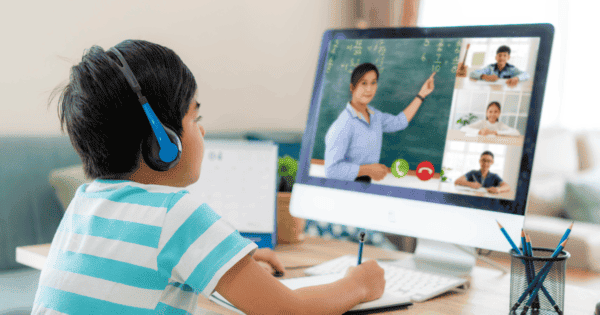Homeschooling: how it will affect children in the future
Homeschooling: how it will affect children in the future

As children prepare for the long-awaited return to school, we must accept that technology will play an even greater role in children’s daily school life. A new survey looks at the impact of remote learning during the third lockdown, particularly live lessons, and how it can affect children.
With live remote lessons still in place for many, Internet Matters psychologist and ambassador Dr. Linda Papadopoulos shares practical advice for parents with children having SWGfL issues.(South West Grid for Learning) launches a campaign on social networks to raise awareness about the mental health of young people when they learn at a distance during the confinement.
Internet Matters Parent Survey: Homeschooling: how it will affect children in the future
As schools across the UK reopen, our new survey reveals both the positive and negative impact remote learning has had on children’s well-being and self-esteem.
The survey * asked parents if having the camera on during live lessons has affected their children’s mental health. While the majority of parents (46%) agreed that live lessons gave their children the opportunity to stay ‘visibly connected’, four in 10 (41%) said they had made their child more aware of their identity and how they look on camera.
Additionally, 43% said their child found it difficult to speak during live lessons and 37% said they were more anxious than normal when asked to attend with the camera on.
Dr. Linda on remote learning: Homeschooling: how it will affect children in the future
Since remote live lessons are likely to remain in place for many students for some time, we launched a video series with their ambassador and child psychologist, Dr. Linda Papadopoulos, who provides expert advice on how to support your children. if you find it difficult to have the camera on during live lessons.
The videos are geared toward elementary and middle school age parents, focusing on positive steps they can take to help them manage any anxiety they have in dealing with individual issues.
SWGfL on remote learning: Homeschooling: how it will affect children in the future
SWGfL (South West Grid for Learning) is also launching a social media campaign for children ages 13-18 to inform them that they are not alone in the problems they have faced during lockdown and remote learning. They collaborated with the Priory Learning Trust and Headstart Kernow and interviewed more than 600 students who agreed that technology can be a blessing, but it can also present a number of wellness issues. The campaign shares the experiences of confinement of a group of children and the innovative ways in which they cope.
Most agreed that while it has allowed them to stay connected and keep up with school work, they have become so dependent on technology that they can sometimes feel tied to it. The Instagram campaign will feature short videos in which 13-18 year olds will talk about how they cope with the daily stresses of pent-up learning and will raise awareness of what young people can do to support their mental health.
Statistics and figures
The survey also looked at what parents thought the legacy of homeschooling would be:
- More than half (52%) said they are concerned about the long-term impact online learning will have on their children’s confidence and self-esteem.
- Almost four in 10 (39%) want more help on how to handle it
Online safety was also a growing concern for parents as a result of the lockdown, such as
- more than half (53%) want schools to teach children more about this topic and 47% said they need more help themselves
- Increased screen time was another concern, as more than half (52%) of parents said they are concerned about the amount of time their child has to spend on digital devices each day due to the crash.
Lasting thoughts
Carolyn Bunting, CEO of Internet Matters, said: “Parents are understandably concerned about the long-term impact of confinement on their children and many may be confused about what is beneficial for them and what could cause them distress.
“What is clear is that we have to accept that technology will play an even more important role in children’s daily school life, including live remote lessons.
“We are pleased to be able to offer help and support through the resources on our website, including some new videos that address how to support your child if having a camera on during lessons causes them anxiety.”
Dr. Linda Papadopoulos said: “At this time, it is understandable that parents are concerned about the impact of remote learning on their children, especially when it comes to video lessons. But there are many positive steps you can take to help.
“For younger kids, it’s about handling the basics, making sure they can see and hear well, and keeping them engaged with supporting the school.
“When it comes to older children, they are much more socially aware, so it is important to help them deal with individual anxieties and problems they have, without letting them feel more exposed during online lessons than they usually are.
“It’s also about reinforcing the idea that this is a moment in time that has affected us all, but it doesn’t have to be something that affects who we are, it’s temporary.”
David Wright, Director of the UK’s Safer Internet Center, said: “Technology has ensured that young people can continue to learn, socialize and communicate during this third lockdown; however, we know that there are many problems that you have faced along the way.
“Through our survey, we found that many children face the same difficulties, whether they are problems with having the camera turned on during remote live lessons or concerns about relying too much on technology.
“The important thing is that children know that they are not alone in the problems they have faced and that they can feel a sense of accomplishment when they return to the classroom for the first time this year.”
To watch Dr. Linda Papadopoulos’s video series and learn more about online safety and how to support your child, go to www.internetmatters.org/remote-learning-tips .
To follow the SWGfL campaign on Instagram, go to www.instagram.com/swgfl_official







